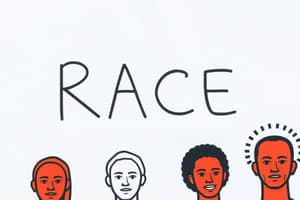Podcast
Questions and Answers
How do sociologists define race?
How do sociologists define race?
Race is a group of people who share physical characteristics that are passed on through reproduction; it is not biological, but a social invention.
How do sociologists define ethnicity?
How do sociologists define ethnicity?
Ethnicity is based on a group of people who share basic cultural features and identify with each other based on common social, cultural, and national experiences.
What is an ethnic group?
What is an ethnic group?
An ethnic group is a group of people who share basic cultural features.
How do sociologists define minority?
How do sociologists define minority?
What do sociologists mean by racial or ethnic minority groups?
What do sociologists mean by racial or ethnic minority groups?
What is prejudice, and why is it attitude-based?
What is prejudice, and why is it attitude-based?
What is discrimination, and why is it action-based?
What is discrimination, and why is it action-based?
What do sociologists mean by institutional discrimination?
What do sociologists mean by institutional discrimination?
What do sociologists mean by color-blind racism?
What do sociologists mean by color-blind racism?
What is De Jure segregation?
What is De Jure segregation?
What is De Facto segregation?
What is De Facto segregation?
What is the functionalist approach to race/ethnicity and inequality?
What is the functionalist approach to race/ethnicity and inequality?
What is the conflict approach to race/ethnicity and inequality?
What is the conflict approach to race/ethnicity and inequality?
What is the exploitation approach to race/ethnicity and inequality?
What is the exploitation approach to race/ethnicity and inequality?
What is the Principle of Cumulation and what does it suggest about racial/ethnic inequality?
What is the Principle of Cumulation and what does it suggest about racial/ethnic inequality?
Flashcards are hidden until you start studying
Study Notes
Definition of Race
- Race is defined as a group sharing physical characteristics passed through reproduction.
- It is a social construct, not a biological reality, and its meaning is created by societal perceptions.
Definition of Ethnicity
- Ethnicity refers to a group that shares fundamental cultural features.
- It is based on common social, cultural, and national experiences that foster identification among group members.
Ethnic Group
- An ethnic group consists of individuals sharing basic cultural features, fostering a sense of connection.
Definition of Minority
- A minority is a group with limited power, resources, and opportunities, subject to different treatment compared to dominant groups.
Racial or Ethnic Minority Groups
- These groups are viewed as inferior based on distinct physical and cultural traits that lead to differential treatment.
Prejudice
- Prejudice involves forming opinions before understanding the relevant facts, typically resulting in unfavorable judgments based on characteristics such as gender or social class.
- It is attitude-based, representing beliefs rather than actions.
Discrimination
- Discrimination entails treating individuals prejudicially based on their actual or perceived group membership, often in a manner worse than typical treatment.
- It is action-based, reflecting how people treat others, in contrast to the feelings of prejudice.
Institutional Discrimination
- Institutional discrimination refers to systemic inequalities that deprive certain groups of equal access to resources and opportunities, such as voting rights or social services.
Color-Blind Racism
- Also known as race blindness, this concept describes ignoring racial characteristics in decision-making processes, which can perpetuate inequality despite an appearance of neutrality.
- An example includes college admissions that do not consider the racial backgrounds of applicants.
Patterns of Racial/Ethnic Inter-Group Contact
- Various patterns exist in how racial and ethnic groups interact, impacting societal dynamics and relations.
De Jure vs. De Facto Segregation
- De Jure segregation refers to legal segregation enforced by laws.
- De Facto segregation occurs in practice and in reality, regardless of legal statutes.
Functionalist Approach
- The functionalist perspective posits that prejudice and discrimination can disrupt societal harmony but may provide benefits for dominant groups, contributing to stability within these groups.
Conflict Approach
- The conflict perspective emphasizes ongoing tensions between dominant and minority groups, leading to racial hierarchies, economic inequality, and social stratification.
Exploitation Approach
- This view suggests that prejudice and discrimination are integral to capitalism, with minorities serving as a cheap labor source that keeps wages low for all workers, benefiting consumers.
Principle of Cumulation
- Discrimination perpetuates an inferior status for minorities, which is then cited as justification for continued differential treatment.
Studying That Suits You
Use AI to generate personalized quizzes and flashcards to suit your learning preferences.




